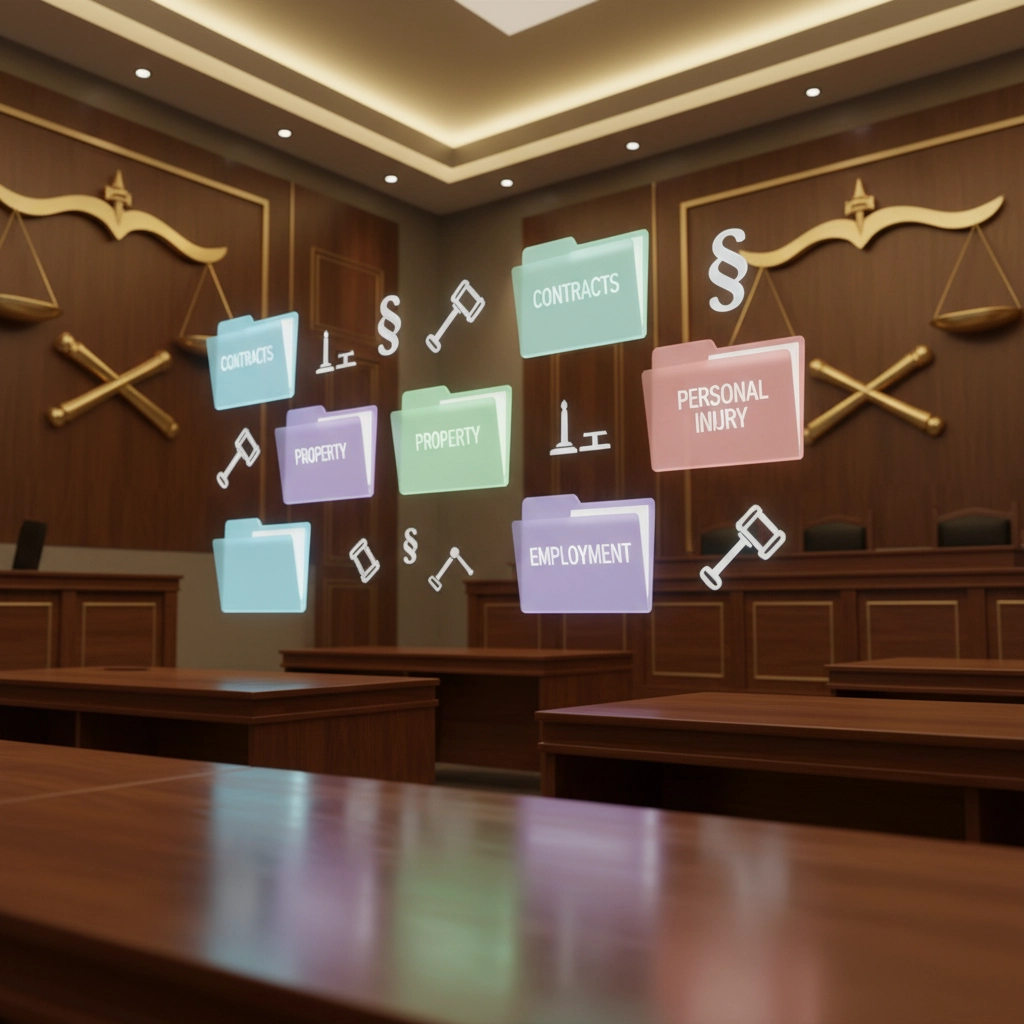Civil litigation can feel overwhelming when you’re facing a legal dispute, but understanding the basics can help you make informed decisions about your case. Whether you’re an individual dealing with a personal matter or a business facing commercial disputes, this comprehensive guide explains everything you need to know about civil litigation and civil disputes in the UK.
What is Civil Litigation?
Civil litigation is the legal process used to resolve disputes between private parties: individuals, businesses, or organisations: through the court system. Unlike criminal cases where the government prosecutes someone for breaking the law, civil litigation involves private parties seeking compensation, specific performance, or other remedies for harm caused by another party’s actions or negligence.
The primary goal isn’t punishment (like in criminal law), but rather to make the injured party “whole” again through monetary compensation or court orders requiring specific actions.
What Types of Cases Fall Under Civil Litigation?
Civil litigation covers an extensive range of disputes. Here’s a comprehensive breakdown of the main categories:

Contract Disputes
These are among the most common civil cases and involve disagreements over the terms, performance, or breach of contracts, including:
- Business-to-business contract breaches
- Employment contract violations
- Service agreements gone wrong
- Sale of goods disputes
- Partnership agreements
- Construction contracts
- Supply chain disagreements
Personal Injury Claims
When someone is injured due to another party’s negligence or intentional actions:
- Road traffic accidents
- Workplace injuries
- Medical negligence and clinical malpractice
- Product liability (defective products causing injury)
- Slip and fall accidents
- Professional negligence (solicitors, accountants, financial advisors)
Property Disputes
Conflicts involving real estate and personal property:
- Boundary disputes between neighbours
- Landlord and tenant disagreements
- Property damage claims
- Trespass cases
- Easement disputes
- Property ownership conflicts
- Building defects and construction disputes
Employment Disputes
Workplace-related conflicts that can be pursued through civil courts:
- Wrongful dismissal claims
- Discrimination and harassment
- Breach of employment contracts
- Restrictive covenant disputes
- Wage and overtime disputes
- Workplace injury claims
Debt Recovery
Cases involving unpaid debts and financial obligations:
- Unpaid invoices and commercial debts
- Credit card debt recovery
- Loan defaults
- Mortgage arrears
- Director’s personal guarantees
- Professional fees recovery
Family and Matrimonial Disputes
Civil aspects of family law matters:
- Divorce proceedings and financial settlements
- Child arrangement disputes
- Matrimonial property division
- Prenuptial agreement enforcement
- Cohabitation disputes
Intellectual Property Disputes
Protecting creative and business assets:
- Copyright infringement
- Trademark violations
- Patent disputes
- Trade secret theft
- Domain name conflicts
- Breach of confidentiality agreements
Commercial and Business Disputes
Complex business-related litigation:
- Shareholder disputes
- Partnership dissolution
- Corporate governance conflicts
- Merger and acquisition disputes
- Commercial fraud claims
- Competition law violations
Examples of Civil Litigation Cases
To better understand civil litigation, here are real-world examples of common cases:
Contract Dispute Example: A construction company fails to complete building work according to the agreed specifications and timeline. The property owner can sue for breach of contract, seeking damages to cover the cost of hiring another contractor to complete the work properly.
Personal Injury Example: A customer slips on a wet floor in a supermarket that wasn’t properly marked with warning signs. The customer suffers a broken wrist and can sue the supermarket for negligence, seeking compensation for medical expenses, lost wages, and pain and suffering.
Employment Dispute Example: An employee is dismissed without proper notice or procedure. They can bring a wrongful dismissal claim seeking compensation for lost wages and benefits, as well as damages for the manner of dismissal.
Property Dispute Example: Two neighbours disagree about the exact location of their property boundary, with one claiming the other has built a fence on their land. This requires civil litigation to determine the correct boundary and potentially order removal of the fence.
Most Common Civil Cases in the UK
Based on recent court statistics and legal industry data, the most frequently encountered civil cases include:
- Contract Disputes (approximately 35-40% of civil cases)
- Personal Injury Claims (approximately 25-30%)
- Property and Real Estate Disputes (approximately 15-20%)
- Employment Disputes (approximately 10-15%)
- Debt Recovery Cases (approximately 10-12%)
Personal injury claims, particularly those related to road traffic accidents, have historically been very common, though recent reforms and insurance changes have affected claim volumes. Contract disputes remain consistently high as business relationships become more complex.
What About “Crimes” Under Civil Law?
This is a common source of confusion. Civil law doesn’t actually cover “crimes” in the traditional sense: crimes are handled by criminal law and prosecuted by the Crown Prosecution Service. However, some actions can lead to both criminal charges and civil claims:
Civil Wrongs (Torts)
These aren’t crimes, but wrongful acts that can be pursued civilly:
- Negligence: Failing to take reasonable care, causing harm to others
- Defamation: Damaging someone’s reputation through false statements
- Trespass: Unlawfully entering someone’s property
- Nuisance: Interfering with someone’s use and enjoyment of their property
- Fraud: Intentional deception for financial gain (can be both criminal and civil)
Overlapping Criminal and Civil Matters
Some actions can result in both criminal prosecution and civil claims:
- Assault: Criminal charges by the state AND a personal injury claim by the victim
- Fraud: Criminal prosecution AND civil recovery action for stolen funds
- Harassment: Criminal charges AND civil injunction to prevent further contact
- Theft: Criminal prosecution AND civil claim for recovery of property value
The key difference is that criminal cases result in punishment (fines, imprisonment), while civil cases focus on compensation and remedies for the victim.
The Civil Litigation Process

Understanding the civil litigation process can help you know what to expect:
Pre-Action Stage
Before starting court proceedings, parties are encouraged to resolve disputes through:
- Direct negotiation
- Mediation
- Alternative Dispute Resolution (ADR)
- Pre-action protocols for specific types of cases
Court Proceedings
If settlement isn’t possible:
- Claim Form Filing: The claimant files a claim with the appropriate court
- Defence: The defendant responds to the claim
- Case Management: The court manages the case progression
- Disclosure: Parties exchange relevant documents
- Witness Statements: Written evidence from witnesses
- Trial: If no settlement is reached, the case goes to trial
- Judgment: The court makes a decision
- Enforcement: If necessary, steps to enforce the judgment
Settlement
Most civil cases settle before reaching trial, often saving time, money, and stress for all parties involved.
Which Courts Handle Civil Cases?
Different courts handle different types of civil matters:
- County Court: Most civil claims, including contract disputes, personal injury, and property matters
- High Court: Higher value or complex cases, divided into specialist divisions
- Employment Tribunal: Employment-related disputes
- Small Claims Court: Lower value claims (typically under £10,000)
- Specialist Courts: For specific areas like intellectual property or commercial disputes
When Should You Consider Civil Litigation?
Consider civil litigation when:
- You’ve suffered financial loss due to another party’s actions
- Negotiation and informal resolution attempts have failed
- You need a court order to prevent ongoing harm
- The other party refuses to acknowledge responsibility
- You need to recover debts or enforce contractual obligations
- Your legal rights have been violated
However, always consider the costs, time, and stress involved. Sometimes alternative dispute resolution methods can achieve better outcomes more efficiently.
Why Choose Professional Legal Support?
Civil litigation is complex, with strict procedural requirements, deadlines, and rules of evidence. Professional legal representation ensures:
- Proper case assessment and strategy development
- Compliance with court procedures and deadlines
- Effective negotiation and settlement discussions
- Strong representation at trial if necessary
- Cost-effective resolution approaches
Need Expert Civil Litigation Support?
Searching for “civil litigation near me”? Judge Law is Windsor and London’s trusted, responsive legal team with extensive experience handling all types of civil disputes. Our problem-solving approach combines deep local knowledge with clear communication, ensuring you understand your options every step of the way.
We pride ourselves on speed and responsiveness: because we know legal disputes can’t wait. Our experienced solicitors provide honest assessments of your case and work efficiently to achieve the best possible outcome, whether through negotiation, mediation, or court proceedings.
From contract disputes and personal injury claims to property disagreements and business conflicts, Judge Law’s civil litigation team has the expertise to protect your interests and fight for justice.
Ready to discuss your civil dispute with experts who understand both the law and your local area? Contact Judge Law today for a confidential consultation and let our dedicated team provide the clear guidance and strong representation you deserve.





